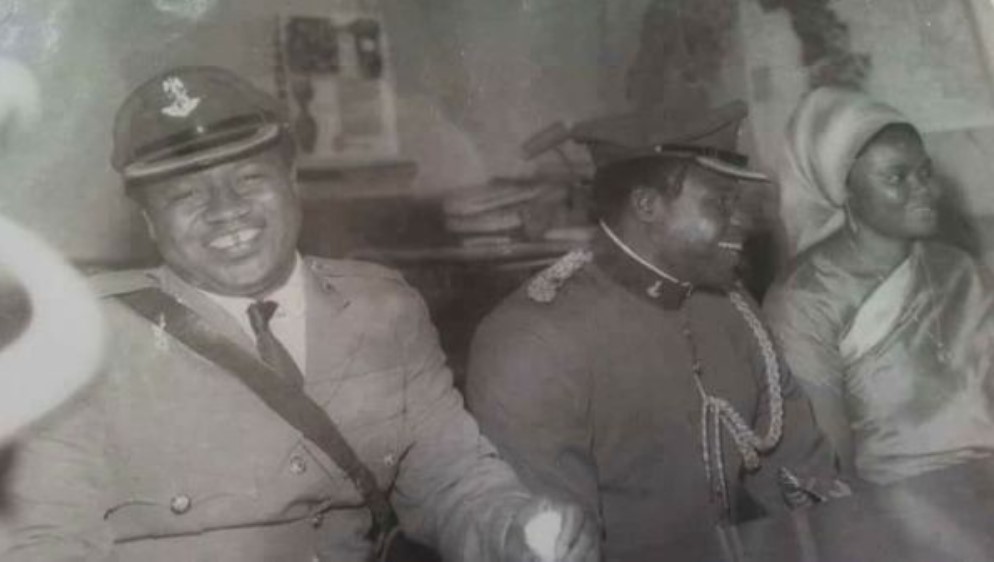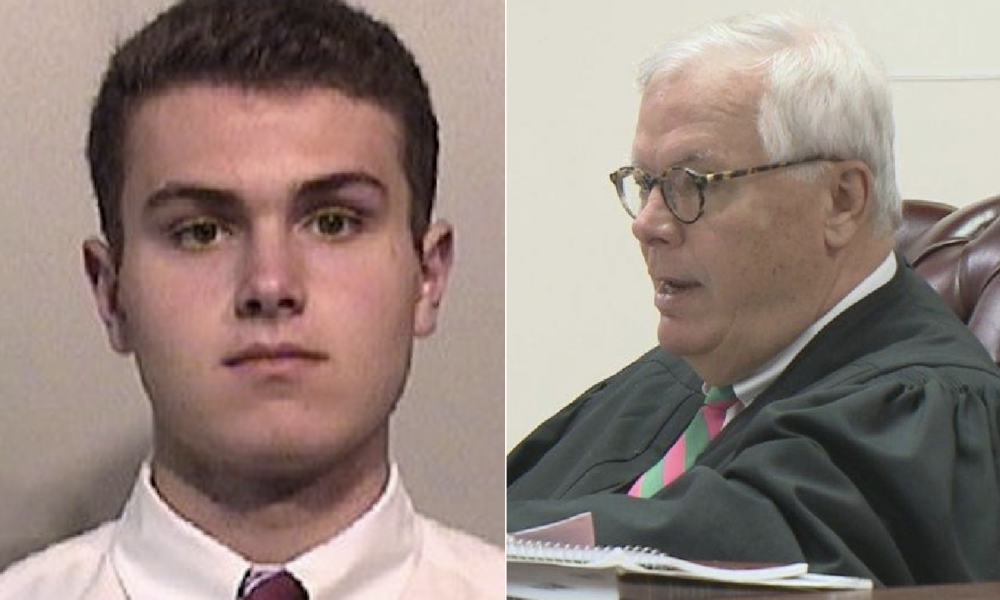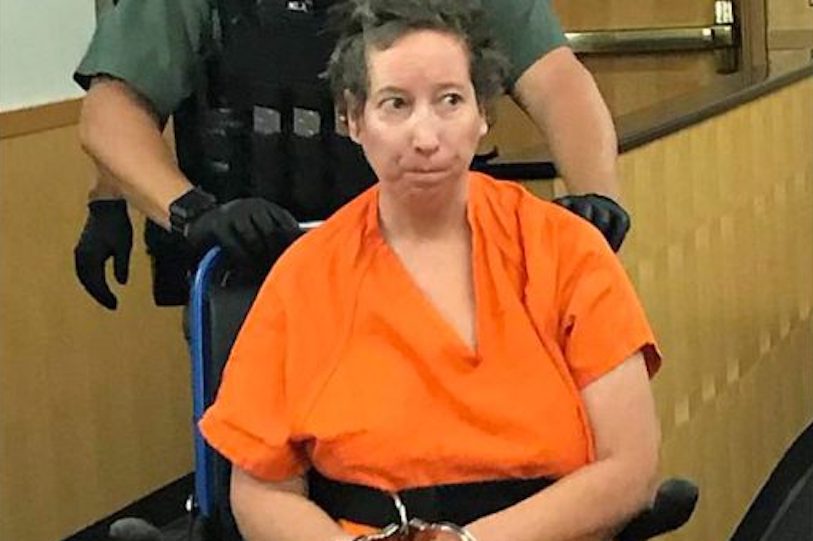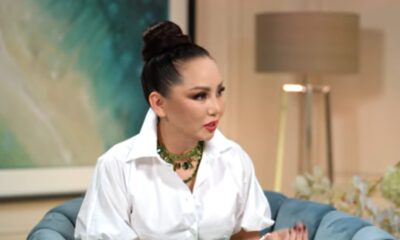The chilling story has been told how Nigeria’s former military president Ibrahim Babangida killed his bestfriend, Maman Vatsa On Saturday, 17 August, friends and well wishers will be sending goodwill messages to greet former Nigerian military president (from 27 August 1985 to 26 August 1993), Ibrahim Badamasi Babangida on his 78th birthday. In other words, he will be two years shy of 80! He was born on 17 August 1941
…Click Here To Continue Reading>> …Click Here To Continue Reading>> READ FULL STORY HERE>>>CLICK HERE TO CONTINUE READING>>>
There is no way his history will be written without the coup he carried out, the ones he survived, those he concocted and others. Below is a story of how he killed his best friend, General Maman Vatsa for alleged coup. It was earlier published on this platform and in the hard copy of TheNEWS, entitled:
How Babangida Murdered Vasta, by Ademola Adegbamigbe.
Sava Farm, a nondescript piece of property situated at Malali area of Kaduna city, does not reveal the importance of its occupant. It is owned by Hajia Sufiya, widow of General Mamman Vatsa, executed over a controversial coup by the regime of General Ibrahim Babangida in 1986. With its brown gate, half brick, half metal perimeter fence that looks as if it would collapse any time with the heavy rains, and the rusty signboard defaced by four posters of Isiah Balat who is campaigning to be governor of Kaduna State, the farm stands as a relic, in sharp contrast to the more prosperous-looking Federal Government College and the Kaduna State Water Board nearby.
The bushy farm looks like an abandoned American ranch after a typical Red Indian invasion. An aide who doubles as the gate keeper opened the gate. As the reporters’ feet shuffled on the cobblestones that had seen better days, a quick survey of the premises showed a once-buoyant animal husbandry business. Another gate, on the left, leads to where Sufiya lives. With a quick detour, the visitors were ushered into the front of the main bungalow. The circular forecourt is habitat to flowers crying for pruning. Peeping out of the circle was a white Mercedez Benz 190 that stood as if, driven by some invisible hands from outer space, it was ready to engage the reverse gear, receding further into the dense flowers, away from the intruders…A ricketty peugeot pick -up van and an abandoned white farm truck complete the picture of neglect. Sufiya’s balcony is a testament to a woman who, when she was happy, was in love with nature. Her suspended empty bird cages, creeping flowers, pots of cacti and aloe vera stand as proof. A long white hose meandered on the floor, a mark of half-hearted gardening.
Like her property, Hajia Sufiya Vatsa is a lone historical figure, abandoned in her woes and penury by successive governments after IBB executed her husband over a questionable coup. During a visit to her Sava Farm by three journalists from TheNEWS, the woman cut the picture of Miss Havisham in Charles Dickens’ Great Expectations, who, after being disappointed by her suitor, refuses to see the sun, fails to change her wedding gown and leaves her watch permanently “at twenty minutes to nine.” Unlike Miss Havisham, however, Sufiya’s separation from her husband came from the machination of a third party – IBB. Since then, life has been horrible for her family.
Daily, Sufiya sits by two high-definition photographs of her husband: one in mufti and the other in military gear. When this magazine visited her, she wore a brown wrapper, deep brown headgear with an ankara top embossed with brown irregular designs. She sat behind a small centre table set with assorted drinks, beverages and local herbal solutions. In front of her was a shelf with a rectangular mirror, on which an old television set was placed.
Another symbol of her state of mind and the neglect she suffers was an abandoned grey aquarium, tilting against the wall under the portrait of a medieval soldier riding a chariot, shooting an arrow. Under another congested table in front of her was a green book, Makers of Modern Africa. A reading lamp, about four chandeliers and a dining table required dusting just as her life requires rehabilitation. An extension of her melancholy was that, contrary to expectation, she declined an interview since it would bring back a deluge of old, painful memories.
Sufiya’s journey into the abyss of poverty began on 23 December 1985. The family had just concluded plans to travel to Calabar because, usually, they spent the yuletide in the Cross River State capital (Sufiya is Efik), the Id-el-Fitri in Minna, Niger State and the Id-el Kabir in Kaduna. After the necessary packing for the trip, the family waited for the return of General Vatsa from the Armed Forces Ruling Council (AFRC) meeting he had attended. He returned home late, so the trip was postponed till the following day. At about 12 midnight, while Sufiya was watching a movie in her bedroom, her husband, who was working in his study, rushed in to tell her that IBB had sent for him. The wife protested that it was too late in the night and that Vatsa should phone his boss to shift the meeting to the following morning.
As this debate was going on, Lt. Col. U.K. Bello led a team of soldiers to Vatsa’s home at Rumens Street, Ikoyi, Lagos. The soldiers, who came with armored vehicles and military vans, surrounded the house. Vatsa told his wife who was upstairs to peep through the window. Unable to contain her fear, she rushed downstairs and insisted that if the soldiers would take away her husband, then she had to follow them. Sufiya insisted on driving Vatsa in her own Pengeot 404. At this point, Vatsa directed that the children be woken up, and he kissed them one after the other. Haruna, the first son, who was in Military Training School, Zaria, followed them downstairs, weeping. While UK Bello drove in the fore of the convoy, Sufiya and Vatsa were chauffeur-driven in their own car in what later turned out to be a merry-go-round about Lagos till about 2 a.m when they stopped at 7 Cameron Road, Ikoyi. Vatsa was ordered out of the car. As he made to enter the building, Sufiya ran after him but she was rudely pulled back by the soldiers. The General turned and gave his wife a bear hug, an embrace that was their last. He urged his wife to take care of their children. Sufiya returned home dejected. To her shock, the military authorities had withdrawn the official domestic staff. At 5a.m, she prepared breakfast of fried yam and pawpaw, drove to her husband’s detention centre but was told she could not bring in any food.
Another surprise awaited Vatsa’s wife. A soldier came in and said: “Madam, Oga’s wife, Mrs Mariam Babangida, said I should bring General Vatsa’s telephone handset to her.” Fatima, Vatsa’s daughter, clung to the gadget. A struggle ensued between the 15-year-old girl and the soldier, whose muscles bulged like the biceps of a Michaelangelo’s statue. Sufia asked her daughter to let go of the probably bugged set.
Worse still, some gruff, fierce-looking soldiers, led by Vatsa’s former Aide-de-Camp (ADC), Captain Maku, an intelligence officer of Idoma extraction, had led other soldiers in laying siege to the family’s house. “Madam, no visitors, no phone calls, no going out,” Maku snapped as he reclined on a settee in the living room, an improvised toothpick, peeping out of a corner of his mouth. When Sufiya protested that the family needed to buy foodstuff, Maku, whose friendly disposition when he was Vatsa’s batman had changed, commanded that the woman and her children “must manage.”
After three days of captivity, Sufiya could not endure it any longer. She told Maku: “Look, I am going to the market. If you refuse me, it means between you and I, somebody will die. I will show you I am a soldier’s wife.” She took her car, and without bothering about the soldiers, who cocked their guns menacingly at her, rammed it into the gate, which gave way as the soldiers scattered capriciously in different directions. She got to Falomo, bought bread and eggs, and decided to see one of her husband’s friends, General Gado Nasko. Before the visit to Nasko, however, Sufiya had driven home and, since her daughter was, coincidentally, at the gate, had dropped the food and driven to the Naskos.
Sufiya’s mission was to ask Nasko to fix a meeting between her and IBB to find a way to settle the matter. Although soldiers at Nasko’s house gave her the cold shoulder, her persistence worked.
Nasko, who said he was aware of the problem and would try to arrange the meeting, asked Sufiya to see him in the evening. Her hope soared. The reason was the special relationship between her family and IBB’s. “When we got married,” Sufiya was reported as saying, “I thought IBB and my husband were of the same family. The two wore the same size of dress and pair of shoes. IBB would drop his dirty wears in our house and put on my husband’s. When IBB traveled out, for a further military training my husband took care of Mariam and her children. General Vatsa, apart from mounting the horse when IBB married Mariam, bought their first set of furniture from Leventis on hire purchase.
IBB was also my husband’s best man during our wedding. Whenever Maryam’s Mercedez car broke down, she used to drive my Peugeot 404. We were close.” All these, to Babangida, did not count in the field of realpolitik. Nasko told Sufiya later in the day that the military President was not ready to see her.
Another disappointment awaited Sufiya when she returned to her Rumen’s Street residence, Ikoyi. A soldier from Bonny Camp was waiting for her with an order that the family should vacate the house. Another military officer said the car should be taken to Army Headquarters for security check after which they broke into the car’s glove compartment and confiscated Vatsa’s manuscripts. In frustration, Sufiya hired a trailer and moved the family’s belongings to Kaduna. She and Fatima, however, returned and stayed in Nwakana Okoro, her brother-in-law’s house at Queen’s Drive, Ikoyi. When the military authorities bugged Okoro’s telephone, the lawyer, a Senior Advocate, of Nigeria, became jittery.
All attempts by Sufiya to see her husband were frustrated by the military authorities. It was only Fatima’s trick that worked a bit. Posing as a lawyer, she would follow other counsels into Vatsa’s detention centre and trial venue. Vatsa, however, sent Sufiya a note from Kirikiri, saying: “Do not beg Babangida. He is after my life. Take care of the children. I know it is not easy but God will help you.” When he was to be executed, Vatsa requested that his wrist watch and wedding ring be given to Sufiya. “But by the time they brought the watch and the wedding ring, the ring wasn’t my wedding ring, so I rejected it. “Till today, they have not returned the ring to me,” Sufiya was quoted by a family source.
Sufiya was, therefore, left in the cold, without any wealth to fall back on. Vatsa had only one plot of land in Abuja, but it was taken over by the late despot, General Sani Abacha. At a point, Sufiya approached General Jeremiah Useni, one-time Federal Capital Territory (FCT) Minister, in a bid to reclaim the land. Useni called for the file and told Vatsa’s wife to pay for the land rent. She, however, complained to Useni: “When my husband was a minister in FCT, he refused to allocate land to me, his wife. He said it would be immoral for him to give me land. He said his successor would give me.” Useni looked the other way while Sufiya and her family were deprived of the land.
Not all of Vatsa’s friends abandoned the family, however. “One of his friends came to our aid.” Sufiya once said. “Every other person that was dining and wining with my husband immediately switched over to IBB. Even my children today are not identified with.”
To keep body, soul and the family together, Sufiya, of Efik descent, would travel to Calabar, in Cross River State, and bring food from her people to take care of her children in Kaduna where she has vowed to remain. Apart from buying and selling, Sufiya used to engage in poultry and cattle rearing. In fact, she injected life into her Sava Farm, which she set up in 1971 after the civil war. But robbers ruined the business, a situation that led to the lack of care for the premises, part of which, by the time TheNEWS visited, was overgrown with weeds.
Sufiya, therefore, has brought up her children on a shoe-string budget. Haruna, whom Vatsa asked to be withdrawn from the Nigerian Military Training School, Zaria, because of the way the Army treated him, is now married with two children. Fatima, who is studying medicine, is in London with her husband, while Jubril, who studied law, is in Minna, Niger State. Aisha is a US-based pilot.
Sufiya believes that IBB himself planned the coup. “He wrote the script, got an officer to execute.” The officer in question was close to Mamma Madaki, a former military administrator of Plateau State. Apart from Major General Charles Ndiomu who once made a statement that he regretted killing Vatsa, this magazine gathered that the interview which General Domkat Bali granted TheNEWS (22 May 2006 edition) raised Sufiya’s hope that justice would finally be done.
She once lamented to her husband’s family:” It is painful that my husband was executed as a coup plotter even when he was not. And till this moment, we don’t know where he was buried. That Gen. Domkat Bali interview published in TheNews magazine is one of the good things God has done to us in the Vatsa family. Before, some people did not believe that Vatsa was not a coup plotter; but Bali’s confession explained it all. They should release the corpse of my husband to me so that he can be given a befitting burial. That is my prayer.”
It was for this reason that Sufiya wrote a letter, dated 15 June 2006, to President Olusegun Obasanjo, where she stated: “Although there was no iota of evidence linking my husband with the phantom coup, he was convicted and sentenced to death by the Special Military Tribunal which purportedly tried him and other coup suspects. My husband’s appeal to the Armed Forces Ruling Council against his illegal conviction was yet to be considered when the Head of State, General Babangida had him secretly executed along with the other coup convicts.”
She claimed in the letter that Bali confirmed her husband’s innocence in TheNEWS’ interview when he said: ‘“My regret is that up till now, I am not sure whether Vatsa ought to have been killed because whatever evidence they amassed against him was weak. My only regret is that I could not say, don’t do it. I am not so sure whether we were right to have killed Vatsa.” Sufiya, therefore, requested the Obasanjo administration to prosecute General Babangida for “the murder of my husband, General Vatsa.”
Born on 3 December 1940, Major General Mamman Vatsa attended the Government Secondary School, Bida, Niger State. He enlisted in the Nigerian Army on 10 December 1962 and was trained at the Nigerian Military Training College, Kaduna and the India Military Academy. Vatsa was in charge of the 21 Battalion during the Nigerian Civil War, after which he became an instructor at the Nigerian Defence Academy, Kaduna. Apart from his position as Principal Staff Officer at Army Headquarters, he commanded the 30 infantry Brigade (Ogoja) until July 1975. As the Commander of the Brigade of Guards, a post he held until 1979, Vatsa oversaw the movement of its headquarters from Dodan Barracks to Kofo Abayomi Street, Victoria Island, Lagos.
One proof of his loyalty to his Commander-in-Chief was when, as Commander, Brigade of Guards, Calabar, he was the first to go on air to kick against the 13 February 1976 coup, led by Lt. Col Buka Dimka. During the trial of suspects involved in that coup, he was the Tribunal Secretary. Thereafter, he was appointed the Commander, Brigade of Guards under General Olusegun Obasanjo. Mrs. Vatsa once revealed: “My husband drove General Obasanjo to his Ota farm after he handed over power to the civilians in 1979.”
As Nowa Omoigui wrote, Vatsa was Commandant of the Nigerian Army School of Infantry (NASI) from 1979. “He, along with Lt. Col Bitiyong, developed the Special Warfare Wing and established the doctrinal basis for the establishment of the 82nd Composite Division of the Nigerian Army in Enugu. In fact, it was Vatsa who suggested that the Division be called the “82nd Division” – after the 82nd West African Division, Burma.”
As an accomplished poet and writer, Vatsa was able to publish eight poetry collections for adults and 11 for younger ones. Some of his book titles are Back Again At Watergate (1982), Reach For The Skies (1984), and Verses for Nigerian State Capitals (1973). His pidgin poetry collection is Tori for Geti Bow Leg (1981). His pictorial books are Bikin Suna and Stinger the Scorpion.
His literary interests transcended merely reeling out volumes of verse. He organized writing workshops for soldiers and their families, assisted the Children’s Literature Association with funds, as well as allocating a piece of land in Abuja for a writers village for the Association of Nigerian Authors. Vatsa was so pre-occupied with creativity that he always carried jotters to the toilet, dining table and the bedroom. There were books strewn around in the family’s apartment so much that, as TheNEWS gathered, Sufiya once threatened to “throw these books out.”
Vatsa’s journey to the great beyond started on 17 December 1985 when the military authorities arrested over 100 officers from the Army, Navy and the Air Force. Vatsa was picked up seven days later. They were, for two weeks, investigated by the Brigadier-General Sani Sami-led Preliminary Special Investigation Panel. After this, 17 of them were dragged before a Special Military Tribunal, set up by Bali, at the Defence Minister, at the Brigade of Guards Headquarters, Lagos. The accused officers were Lt.-Cols. Musa Bitiyong, Christian A. Oche, Micheal A Iyorshe, M. Effiong; Majors D.I Bamidele, D.E. West, J.O Onyeke and Tobias G Akwashiki. Others were Captain G.I L Sese, Lt. K.G. Dakpa, Commodore A.A. Ogwiji, Wing Commanders B.E. Ekele, Adamu Sakaba; Squadron Leaders Martin Luther, C. Ode and A Ahura.
The tribunal, chaired by Major General Ndiomu, tried the officers under the Treason and Other Offences (Special Military Tribunal) Decree 1 of 1986. Other members of the tribunal were Brigadier Yerima Yohanna Kure, Commodore Murtala Nyako, Col. Rufus Kupolati, Col E. Opaleye, and Lt. Col. D. Muhammed. Alhaji Mamman Nassarawa, a commissioner of police and Major A Kejawa, the Judge Advocate, were also members. The IBB regime accused Vatsa of trying to overthrow it by hiding behind a farming loan to Lt-Col Bitiyong, a charge which the general denied. As Nowa Omogui, a military analyst explains in his essay, The Vatsa Conspiracy, Bitiyong was allegedly tortured to implicate Vatsa “by making reference to certain private political conversations they had, which Vatsa denied.”
There were further allegations that Luther, Oche, Ogwiji and Bitiyong held a meeting at the Lagos Sheraton Hotel and Towers in November 1985. Iyorchie, Bitiyong, Oche, Ekele, Sakaba and Bamidele also allegedly met in Makurdi. Allegations such as the diversion of the presidential jet to a pre-arranged location by pilots in the executive fleet (Luther and Ahura), as Omogui put it, were floated. Oche allegedly held a meeting with Major Akwashiki, Commander of the 6th Battalion, Bonny Camp, and Onyeke, after a game of squash in Lagos and spoke about the International Monetary Fund (IMF) loan. Akwashiki was sentenced to death, but this was commuted to life imprisonment. He was however released 10 years later by the Abacha regime.
Oche, it was also alleged, mentioned the plot to his nephew, Peter Odoba, a young lieutenant of the Brigade of Guards who, as Omogui wrote, informed then Lt. Hamza al-Mustapha, an intelligence officer to the Chief of Army Staff. Obada was charged with “concealment, recommended for dismissal and a long jail term.” On 6 March 1986, however, Vatsa, Iyorshe, Bamidele, Ogwiji, Ekele, Sakaba, Luther, Akura were executed.Vatsa had taken his trial and sentence with cheerful equanimity like the writer that he was. His vintage smiles revealed more than his words. “I leave you with smiles as smiles surprise people. But I will tell members of the Nigerian Army that the day you start insulting yourselves, others begin to join you,” he said.
To buttress his position that there was rivalry between IBB and Vatsa, Omogui referred to an interview that Eniola Bello of THISDAY had with IBB in 2001 when he turned 60. ‘“Babangida said it was after Vatsa’s coup was foiled that he realized his childhood friend and classmate planned the coup in line with a deep-seated personal rivalry, going back to their days as young officers. He said that unconsciously, he and Vatsa had been great competitors; that as a young officer, whatever he did Vatsa equally did and whatever Vatsa achieved, he also went after. He said it was Lt. Gen. T.Y. Danjuma who pointed this out to him from their military records.” Babangida gave this rationalization to justify his refusal to pardon Vatsa. He said when he first heard his childhood friend was planning a coup, he decided to do nothing but monitor him. He added, however, that Vatsa came to him to complain thus: You heard I was planning a coup and couldn’t even ask me. What kind of friend are you? To this, Babangida said he replied: I didn’t believe it, or are you planning a coup? He said Vatsa replied in the negative and the matter was forgotten until there was evidence of the plot. Babangida said he instructed that Vatsa be arrested and detained to prevent him from impeding investigation into the matter.
Babangida argued: “However, Vatsa tried to escape through the air conditioner hole. I couldn’t understand why he was trying to escape if he was not involved in a coup plot. But while watching the video of his execution, I turned my eyes away when I saw him remove his watch and ask a soldier to give his wife. I couldn’t continue watching.” Babangida added that he couldn’t retire or imprison Vatsa because he believed the guy could still have planned a coup either in retirement or in prison. “Rawlings did it in Ghana and you know Vatsa was very stubborn,” IBB said.
Omogui, however, lamented the tragedy that befell Vatsa: “Vatsa maintained to the very end that the money was for farming. Others alleged, however, that after being tortured for two days, Bitiyong implicated Vatsa by making reference to certain private political conversations they had, which Vatsa denied. But Vatsa was accused of harbouring “bad blood” against his friend and classmate Babangida, dating back to the Buhari regime and possibly earlier. He was also obliquely accused of reporting Babangida’s coup plot to Buhari before he left the country for pilgrimage along with Major General Tunde Idiagbon in August, 1985. Actions he later took as a Minister to accelerate many military applications for certificates of occupancy for land in Abuja, came to be viewed as efforts to buy the support of one or two of the plotters. Rumors that a civilian had introduced him at a party as Nigeria’s next President were even aired. All of this was, of course, circumstantial. But they took him to the stake, which was quite an anti-climax to the career of a brilliant man who never took part in any coup in Nigeria. Indeed, Mamman Vatsa was the first to go on air in Calabar to denounce the Dimka coup, and was later the Secretary of the Obada panel that tried Dimka and others in 1976. This little detail may have earned him some latent enmity in certain circles of the Army which later contributed to his death.”
There is also a very strong belief that Vatsa may have been a victim of political intrigues because of his intellectual sagacity, being a writer and soldier-poet, and his significant indifference to the military politics at that time. In fact, his ordeal had attracted three leading Nigerian literary icons, Chinua Achebe, Wole Soyinka and John Pepper Clark Bekederemo, who had gone to plead with Babangida for clemency, only to be shocked by news of his execution few minutes after departing Dodan Barracks, venue of the meeting.
But in a swift reaction tainted with arrogance and insensitivity, Alhaji Shuibu Badeggi, Special Assistant on Public Communication to Governor Abdulkhadir Kure of Niger State and an aide of Babangida, stoutly defended the execution, claiming that a process found Vatsa and nine others culpable in the coup saga. According to him, Mrs. Vatsa’s petition is baseless. “She should shut up. Shut up! If you commit a coup and you know the punishment is death, then you should face it. That’s all. Those who plot a coup, when the coup fails, they die. Simple. Talking about those saying all sorts of negative things about IBB, they are only out to score cheap political goals. Envy, grudge, that’s all. It is envy and madness. Otherwise, if you thought 20 years ago that your husband had been wrongly accused of a coup plot and executed, why wait till now to demand that Babangida be punished? If anybody or group is using her to smear Babangida’s image, then they have a problem because it is not Babangida who desperately wants to be president of Nigeria. It’s we his supporters. There is nothing anyone of them can do in this and any other case.”
This may be Badeggi’s simple response to a complex issue which is already generating interest across the country. The day Badeggi’s outburst came out, TheNEWS gathered, Mrs. Vatsa did not hold back her own ballistic missile. She reportedly said: “Anybody who says I am being used is a big fool. In the first place, my husband made Kure. As a Minister, my husband brought Nupe people to government. That was when Kure came to Abuja to work with my husband. If Kure was not made by my husband, would he be in a position to have an aide like the one talking rubbish? That aide should shut up 100 times. Nobody is sponsoring me. All I want is the matter to be opened up so that the whole world will witness the case. There are many other thousands of innocent people in the grave whom IBB murdered. Their souls are crying for justice. All those he made widows and orphans are seeking justice. He has no hiding place. Should anybody or group of persons make any mago mago to force IBB on Nigerians, the Aba women riot of 1929 will be a child’s play to the women riot that will be witnessed in 2007.” Will justice be done in the Vatsa case?





 HEALTH & LIFESTYLE9 months ago
HEALTH & LIFESTYLE9 months ago
 IN-THE-NEWS10 months ago
IN-THE-NEWS10 months ago
 IN-THE-NEWS11 months ago
IN-THE-NEWS11 months ago
 IN-THE-NEWS6 months ago
IN-THE-NEWS6 months ago
 HEALTH & LIFESTYLE9 months ago
HEALTH & LIFESTYLE9 months ago
 METRO10 months ago
METRO10 months ago
 SPORTS11 months ago
SPORTS11 months ago
 IN-THE-NEWS6 months ago
IN-THE-NEWS6 months ago